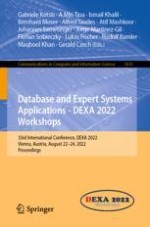2022 | OriginalPaper | Buchkapitel
A Comparative Study Between Rule-Based and Transformer-Based Election Prediction Approaches: 2020 US Presidential Election as a Use Case
verfasst von : Asif Khan, Huaping Zhang, Nada Boudjellal, Lin Dai, Arshad Ahmad, Jianyun Shang, Philipp Haindl
Erschienen in: Database and Expert Systems Applications - DEXA 2022 Workshops
Aktivieren Sie unsere intelligente Suche, um passende Fachinhalte oder Patente zu finden.
Wählen Sie Textabschnitte aus um mit Künstlicher Intelligenz passenden Patente zu finden. powered by
Markieren Sie Textabschnitte, um KI-gestützt weitere passende Inhalte zu finden. powered by
